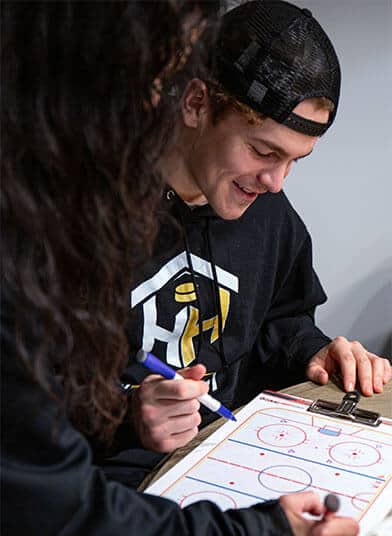Master the Mental Game to Unlock Your Hockey Potential

The Essence of Mental Performance
Unleash your peak performance with sports psychology and visualization. Learn key mental tools to build your hockey confidence and perfrom when it matters most. Gain the competitive edge, boost resilience, and unlock your true potential!
The Benefits of Mental
Performance Training

Perform
Under Pressure
Learn the mental game tools to become a more clutch performer, so you can be prepared to show up when it matters most.
Build
Hockey Confidence
Develop more consistent feelings of confidence in your game, so you can play closer to your true potential.

Overcome
Mental Blocks
Be prepared to overcome challenges by equipping yourself with the tools to keep you focused on your path to success.
Precision Consultation Behind
Mental Performance Excellence

Taylor Staden
Unlocking the Potential in Our Players
Frequently Asked Questions
Generally speaking, mental performance consulting is not covered by benefit plans.
Taylor did play hockey growing up, and actively consults with hockey players from professional to youth sport. He has presented to thousands of hockey players on the mental game.
National and professional level athletes.
Confidence can be tricky. It is a nice feeling to have but we also do not need it to perform. What happens to many athletes is that they wait until they feel confident to take action, and in turn, they never take action at all. So confidence comes from giving yourself proof that you can do things, and the best way to give yourself proof is by successfully doing something. So, by doing things outside of your comfort zone, and accepting that it may not go your way, can be a great way to give yourself a chance at creating proof. Because if you never take action, then you never give yourself a shot at success.
Being afraid of making mistakes is one of the most common challenges that athletes face. One way to look at it is that it actually could be due to the fact that they are not worried about messing up, but instead what may happen following making a mistake. Will they get benched? What will others think of them? What will their coach say?
So if this is the case, then learning to accept mistakes and what may follow could be a helpful starting point. Now accepting mistakes does not mean that they do/should not care, but it is instead about simply recognizing that anytime you try to do something (especially something challenging and meaningful) that there is a chance it may not work out. But the only chance you
have at pulling something off is if you actually try and go for it. Because if you do not go for it, then you are giving yourself a guaranteed shot at failure. Which is a mistake, in and of itself.
To produce more consistent hockey players, a large part of it comes from what they focus on. Think about it as a matter of choice. If hockey players focus on things they choose to do/get vs. things they do not have a choice over, then naturally it would make sense that by focusing on things that they choose to do (and in other words, have control over) would help them play more consistently. For example, scoring goals is not a choice (if it was, then you would score on every shot you took). But hockey players do choose to find the open ice, call for passes, take risks.... All things that are helpful in scoring goals! Focus on the recipe, not the end result.
On the one hand, pregame nerves are not entirely a bad thing. They simply mean that you care about what is about to happen, and that you are alive.. So you should have some pregame nerves! So seeing them as a good thing is a great first step. As well, pregame nerves can be seen as an opportunity for hockey players to get pumped up and have extra bursts of energy.
You see, the difference between being nervous and excited is how you look at the feeling. If you see nerves as a bad thing, then you will more likely feel nervous. But if you see them as an opportunity to help you play better, then they are more likely to be seen as excitement! So the reframing can be quite helpful.
However if they still remain unmanageable and overwhelming following reframing, then at that point some relaxation techniques, routines and focus points could be helpful supporting tools.
Mental preparation looks differently for everyone, and different players prefer different thoughts and feelings heading into their games. So for some athletes, mental preparation looks like staying loose before games and keeping things light. For others, it means getting very focused and tense before games. So it is important for hockey players to be aware of their individual needs, and to think of strategies leading up to games (and practices even) to help them feel and think at their optimal levels.
This is a common challenge for many hockey players. They have all of the physical tools to be a difference maker, but they cannot seem to piece it together in a game. Some possible reasons could be due to pregame nerves, worrying about making mistakes, and not having good practice habits. Assuming it is one of these three reasons, learning pregame relaxation techniques, accepting mistakes and committing to doing things within your control, and practising in more game-like scenarios/environments could be possible ways to overcome this.
Ultimately, your kid does not choose their icetime, so it is not a very helpful focus for them. When hockey players focus too much on it, it can lead to a sense of entitlement; as if their coach owes them something. The reality is that they can work very hard at something in life, and not get the outcome they want or feel like they deserve. Instead, a more helpful focus is to consider what they need to do to earn more responsibility on their team. This can come from within, or they can seek external guidance from their coach, advisor etc. If the opportunity permits, speaking to your coach about this can be a good chance to be clear on expectations, and from there you can focus on being a superstar in those areas.
Ready to Elevate Your
Mental Game?
Join Our Mental Performance Program Today and master the mental game with My Hockey House.
Questions? Contact Us!